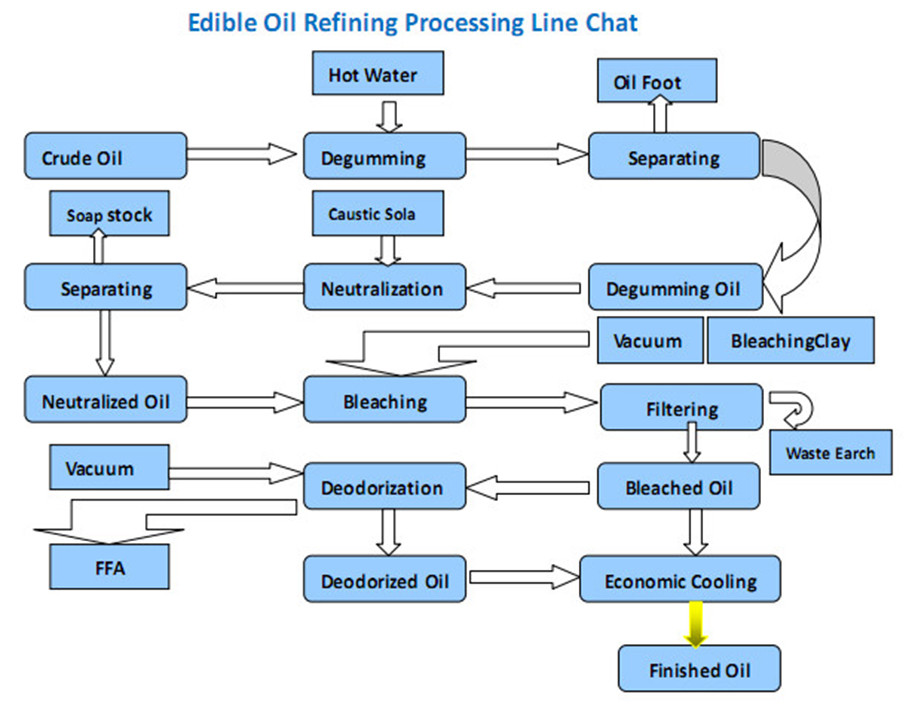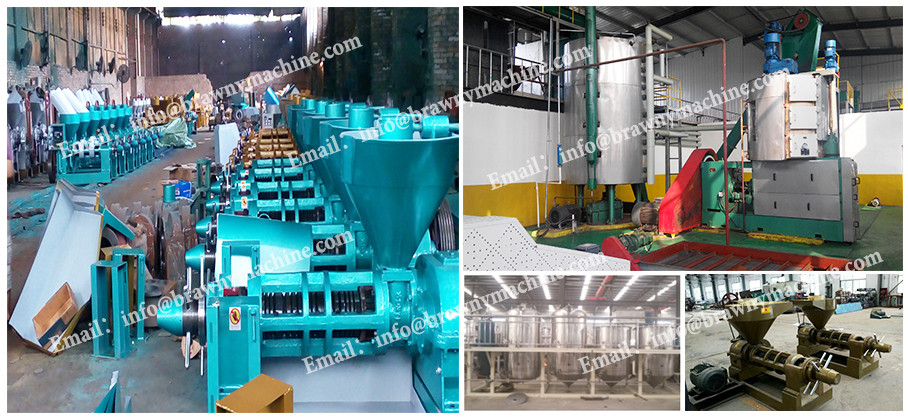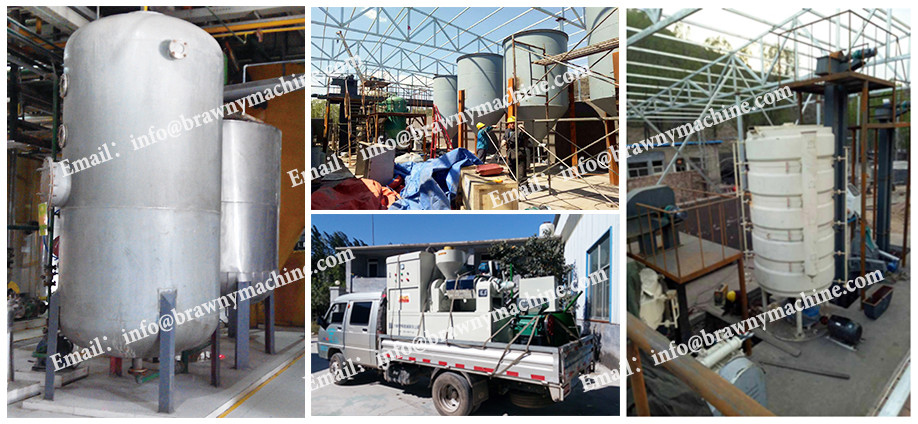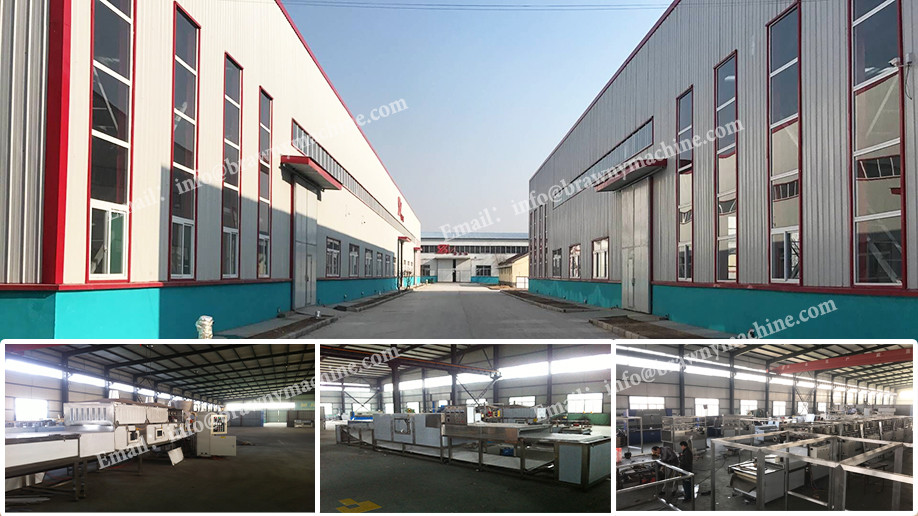Kingdo cooking refinery plant /Cooking Oil Manufacturing Equipment from China
Company Information
1. About Kingdo
a. 20 years manufacturing, sales and installation experience on oil process project.
b. Associated with Henan University of Technology for processing design and new technology development.
c.38 technical engineers research on new efficient processing craft and instruct manufacturing and installation.
d.78 technicians-professional installation team-with rich and mature installation and training experience.
e. CE and ISO9001
Production FlowOil seed we can handle--Listing of feed materials
The main raw materials processed by Oil Industry are rape seeds, soybeans, sunflower seeds, crude palm oil, crude palm kernel oil and crude coconut oil.

Crushing of these oil seeds and beans delivers the following feed materials:
- rape seed and sunflower seed expeller
- soya (bean), sunflower seed and rape seed meal
- soya (bean) and sunflower seed hulls
- vegetable oils (crude degummed soya (bean) -, rape seed – and sunflower seed oil) Soya (beans) and sunflower seeds may be de-hulled, resulting in meal with a low fiber and hence high protein content (“hi-pro” versus “low-pro” meal).
Refining of oils delivers:
- refined vegetable oils (refined rape seed , soya (bean), sunflower seed palm, palm kernel - and coconut oil)
- rapeseed, soybean, sunflower seed , palm, palm kernel, coconut acid oils
- soy -, rape -, sun -, palm -, palm kernel - and coconut fatty acid distillates
- soy -, rape -, sun, palm, palm kernel and coconut deodistillates
Flow charts represents the following main processes applied:
- Pretreatment and solvent extraction of oilseeds

Chemical refining of oil
Physical refining of oil

Overview of complete process flow for edible oil making
1) OIL SEED PRETREATMENT AND SOLVENT EXTRACTION
1.1. Cleaning, Drying and Preparation of the seeds/beans
As a first step the seed/bean is cleaned and dried. Foreign material, such as stones, glass and metal is taken out by sieving and magnets and i s disposed of outside the feed chain.
Drying is performed whilst avoiding contact with combustion gasses unless natural gas is used.
Some oilseeds, like soybeans and sunflower seeds, may be de-hulled after cleaning. After de-hulling, the meal has a lower crude fiber content, and hence a higher protein content. The soya hulls can also be used for feeding purposes, as such or in pelletized form.


1.2. Crushing and Heating
Seeds with high oil content, such as rape seeds and sunflower seeds are usually mechanically pressed after a preheating step. The pressed cake contains up to eighteen percent of oil and is further treated in the extractor. In some cases the pressed cake undergoes deep expelling. This brings oil levels down to below ten percent and results in an expeller sold for feed purposes.
Soybeans have a relatively low oil content. They are thermally treated, mechanically crushed into raw materials/flakes that are further extracted.
Sometimes the oil-containing raw material is pressed without heating; such oils are known as cold-pressed oils. Since cold pressing does not extract all the oil, it is practiced only in the production of a few special edible oils, e.g. olive oil.
1.3. Solvent extraction
Solvent extraction separates the oil from the seeds/beans. The pre-processed seeds/beans are treated in a multistage counter-current process with solvent until the remaining oil content is reduced to the lowest possible level. Hexane is commonly used as extraction solvent.
The miscella is a mixture of oil and solvent. It is separated by distillation into its two components, oil and solvent. The solvent is recycled for re-use in the extraction process.

1.4. Desolventising and toasting
The hexane-containing meal is treated in the desolventiser toaster with the help of indirect heating and steam. The desolventising toasting process serves three purposes. Firstly, to recover the solvent from the meal, secondly to increase the nutritional value of the meal e.g. by reducing the content of glucosinolates or trypsin inhibitors, and thirdly to minimise the risk of biological contamination.
1.5. Drying, cooling, storage
To obtain a stable and transportable feed material that is fit for storage, the meal is subsequently dried and cooled.
2) REFINING
Crude oils obtained by pressing and/or extraction are sometimes used directly for food and feed purposes. In most cases, however, the crude oils are refined. Crude oil refining entails the removal of gums or crude lecithins and that of free fatty acids (FFA) from the oil to get a neutral taste of the edible oil while maintaining the nutritional value and ensuring the quality and stability of the product.

2.1 Degumming: chemical and physical refining
Degumming is the first step of refining and involves the removal of the gums/crude lecithins from the oil.
2.2. Neutralisation: chemical refining
FFAs are responsible for oil acidity. Chemical refining is the traditional method of oil refining and involves a neutralisation step of these FFA’s in the crude oil. During neutralisation, the oil is treated with a food grade alkali solution (caustic soda) that reacts with the FFA to form soap stock.

2.3. Bleaching: chemical and physical refining
The purpose of bleaching (or decolorising) is to reduce the levels of pigments such as carotenoids and chlorophyll, but this treatment also further removes residues of phosphatides, soaps, traces of metals, oxidation products, andproteins. These trace components interfere with further processing. They reduce the quality of the final product and are removed by adsorption with activated clay or silica.

2.4. Winterisation: optionally both chemical and physical refining
During winterisation waxes are crystallised and removed in a filtering process to avoid clouding of the liquid fraction at cooler temperatures. Winterisation processes using temperature to control crystallisation are carried out on sunflower and maize oil. This process is also referred to as dewaxing.
2.5. Deodorisation: chemical refining
Deodorisation is a Kingdo cooking refinery plant /Cooking Oil Manufacturing Equipment from China steam distillation process that removes the relatively volatile components that give rise to undesirable flavours, colours and odours infats and oils.
The purpose of deodorisationis to remove odours, off-flavours and other Volatile components such as pesticides and light polycyclic aromatic hydrocarbons by stripping Careful execution of this process will also improve the stability and the colour of the oil, whilst preserving the nutritional value.

2.6 Distillation: physical refining
Physical refining removes the FFAs by distillation; the boiling point of the FFA is lower than that of the triglyceride oil. FFA from physical refining are referred to as fatty acid distillates. Stand-alone refineries, i.e those that source crude oils and hence don’t crush oilseeds often apply physical refining to tropical oils such as palm oil, palm kernel oil and coconut oil. Integrated crushing and refining plants
may also apply physical refining to seed oils such as rape seed, sunflower seed and soybean oil. Physical refining does not involve a neutralisation step of the crude oil and hence no soap stock production.
2.7 Fractionation
Fractionation entails controlled crystallization. Solids are removed by means of solvents or winterization or pressing. Pressing happens with hydraulic pressure or Kingdo cooking refinery plant /Cooking Oil Manufacturing Equipment from China filtration.
Fractionation is used to produce specialty fats from palm and palm kernel oil.

Henan Hi-Tech Kingdo Industrial delivers you:
Value: Experienced and professional engineering team for product design and development
Product : Provide equipments and solutions all over the world and reputed by both domestic and overseas customers.
Quality: Strict quality control system; Of ISO 9001 and BV cert approved
Service: Perfect service system including pre-sale, online and after sale service.
Packaging & Shipping
Proffessional packaing team of eddible oil making plant for overseas shipping:

Our Services
Our Services
- Raw material and finished Oil products Storage equipments
- Oil seeds pretreatment and press production line: 5-4000T per 24 hrs
- Solvent extraction production line: 10-4000T per 24 hrs
- Edible oil refinery production line: 1-600T per 24 hrs
- Oil fractionation engineering
-
Biodiesel production line: 1-600T per 24 hrs
If you are interested in our product,please contact me.
